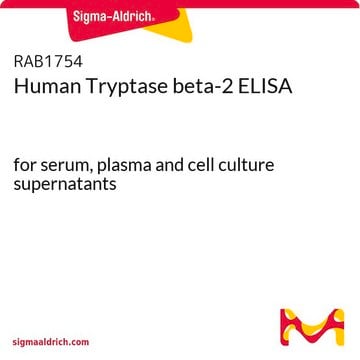MAK432
Histamine Quantification Assay Kit
sufficient for 100 colorimetric tests
Synonym(s):
Histamine Detection Kit
Sign Into View Organizational & Contract Pricing
All Photos(5)
About This Item
UNSPSC Code:
12161503
NACRES:
NA.84
Recommended Products
usage
sufficient for 100 colorimetric tests
Quality Level
application(s)
food and beverages
detection method
colorimetric
storage temp.
−20°C
Related Categories
General description
Histamine is a biogenic amine, generated from the single decarboxylation of the amino acid histidine. Histamine food poisonings are allergy-like food poisonings caused by the ingestion of spoiled food containing markedly elevated histamine levels. Elevated levels of bacterial fermentation can lead to elevated histamine in various food and drink sources such as fish, fermented meat, milk, cheese, beer, and wine.
Application
The Histamine Quantification Assay Kit may be used for:
- Food and Beverage Testing
- Bacterial Fermentation Analysis
Features and Benefits
- Supportive calculator (Click here to download a calculator excel file) Analyze results based on your experimental data!
- Quick instruction bench card - to assure your experimental success
- More experiments in one kit - contains sufficient reagents for 100 tests
Suitability
The kit is suitable for the quantification of histamine in various food and beverage samples.
Principle
The kit is based on the enzymatic oxidation of histamine, which is coupled to the reduction of the formazan WST reagent. The intensity of the product color, measured at 450 nm, is directly proportional to histamine concentration in the sample.
Other Notes
For additional information on our range of Biochemicals, please complete this form.
Storage Class Code
12 - Non Combustible Liquids
Certificates of Analysis (COA)
Search for Certificates of Analysis (COA) by entering the products Lot/Batch Number. Lot and Batch Numbers can be found on a product’s label following the words ‘Lot’ or ‘Batch’.
Already Own This Product?
Find documentation for the products that you have recently purchased in the Document Library.
Biomedical Aspects of Histamine
Khardori N, et al.
SpringerPlus (2011)
Evidence that histamine is the causative toxin of scombroid-fish poisoning.
Morrow J D, et al.
The New England Journal of Medicine, 324(11), 716-720 (1991)
Our team of scientists has experience in all areas of research including Life Science, Material Science, Chemical Synthesis, Chromatography, Analytical and many others.
Contact Technical Service



